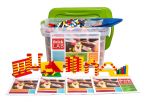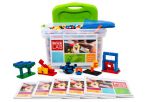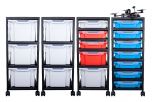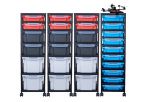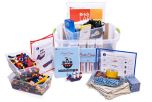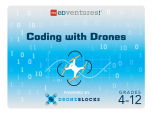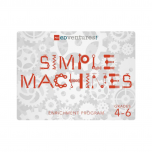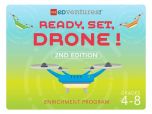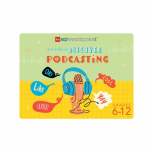BrickLAB Famous Architecture
Travel through history investigating how ancient architectural breakthroughs led to the fundamental design elements we know today. From walls and arches to post-and-lintel building techniques, use hands-on manipulatives and multi-subject integration to inspect and duplicate design elements from around the globe. After the foundation has been poured, utilize the engineering design process to replicate some of history’s most famous designs, then uncover how different societies made the stylistic, artful, and structural considerations of construction and architecture through 12 reusable one-hour lessons. Encourage creativity and guide learners towards STEM enrichment in BrickLAB Famous Architecture Around the World.
Grades: 4–6
Students: Up to 30
Contact Hours: 12+
Get to Know:
Subject Targets:
Technology, Engineering Design, Math Connections, English Language Arts Connections, Social Studies & History Connections
Recommended Settings:
- Summer Camps
- Before & After-School Programs
- Classrooms
Each Activity Includes:
- Opening & Closing Discussion
- Step-By-Step Build Instructions
- Engineering Challenge
- Optional Math & English Language Arts Extensions
- Materials List
Curriculum Topics:
- Architecture Boot Camp
- Architecture Boot Camp: Graduation Day
- El Castillo
- Parthenon
- Palsangjeon Pagoda
- Eiffel Tower
- Patuxai Victory Arch
- Empire State Building
- Taj Mahal
- Notre-Dame
- Blueprints
- Castles
What's in the Box:
BrickLAB Famous Architecture Around the World comes with all the supplies needed for 30 students to complete 12 one-hour activities:
- Instructor Guide: 1
- Student Build Books: 15
- Curriculum Digital Download: 1
- Storage Tubs: 2
- BrickLAB Bricks: 6500+
- Brick Separator: 1
- Mesh Bag (for cleaning bricks): 1
16 thinking habits developed by Art Costa and Bena Kallick to empower students to succeed in a 21st century learning environment.
- Applying Past Knowledge to New Situations
- Creating, Imagining, Innovating
- Managing Impulsivity
- Striving for Accuracy
- Thinking Interdependently
21st Century Skills:
A set of widely-applicable abilities essential for success in the information age.
- Communication and Collaboration
- Creativity and Innovation
- Critical Thinking and Problem Solving
- Initiative and Self-Direction
- Social and Cross-Cultural Skills
© 2019 Battelle for Kids. battelleforkids.org. All Rights Reserved. Battelle for Kids was not involved in the production of this product and does not endorse it.
Common Core State Standards for Mathematics:
- CCSS.MATH.CONTENT.4.OA.B Gain familiarity with factors and multiples.
- CCSS.MATH.CONTENT.4.OA.A Use the four operations with whole numbers to solve problems.
- CCSS.MATH.CONTENT.5.OA.A.1 Write and interpret numerical expressions.
- CCSS.MATH.CONTENT.6.EE.A Write, read, and evaluate expressions in which letters stand for numbers.
- CCSS.MATH.CONTENT.6.RP.A Understand ratio concepts and use ratio reasoning to solve problems.
© Copyright 2010. National Governors Association Center for Best Practices and Council of Chief State School Officers. All rights reserved.
Next Generation Science Standards:*
- NGSS 3-5-ETS1-1 Engineering Design
- NGSS 3-5-ETS1-2 Engineering Design
- NGSS 3-5-ETS1-3 Engineering Design
* Next Generation Science Standards and NGSS is a registered trademark of WestEd. Neither WestEd nor the lead states and partners that developed the Next Generation Science Standards were involved in the production of this product, and do not endorse it.
International Society for Technology in Education:
- ISTE-S.3.d Students build knowledge by actively exploring real-world issues and problems, developing ideas and theories and pursuing answers and solutions.
- ISTE-S.4.a Students know and use a deliberate design process for generating ideas, testing theories, creating innovative artifacts or solving authentic problems.
- ISTE-S.4.d Students exhibit a tolerance for ambiguity, perseverance and the capacity to work with open-ended problems.
- ISTE-S.7.c Students contribute constructively to project teams, assuming various roles and responsibilities to work effectively toward a common goal.
ISTE Standards for Students, ©2016, ISTE® (International Society for Technology in Education), iste.org. All rights reserved. ISTE was not involved in the production of this product and does not endorse it.
| Manufacturer | PCS Edventures, Inc. |
|---|




